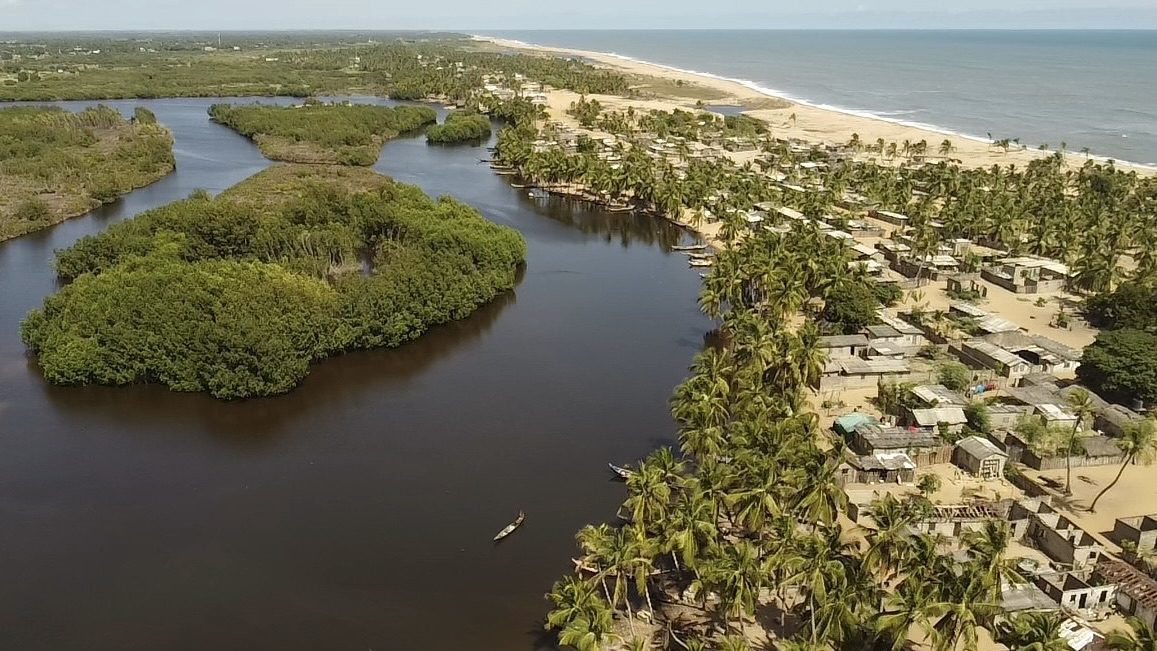WHOI to Receive Funding For Ocean Margins Initiative in West Africa
 Coastal communities in Ghana are affected by the seasonal upwelling system in the Gulf of Guinea. Understanding the underlying physical processes and their biogeochemical implications will help create a more sustainable future for the ecosystem and local communities. (Photo credit: University of Ghana)
Coastal communities in Ghana are affected by the seasonal upwelling system in the Gulf of Guinea. Understanding the underlying physical processes and their biogeochemical implications will help create a more sustainable future for the ecosystem and local communities. (Photo credit: University of Ghana) June 4, 2024
New program at Schmidt Sciences will refine details of ocean carbon cycling and ecosystem resilience
Woods Hole, Mass. — A team of 17 scientists from 13 institutions led by the Woods Hole Oceanographic Institution (WHOI), University of Rhode Island (URI), and University of Ghana, has been selected to initiate a project through the Ocean Biogeochemistry Virtual Institute (OBVI) funded by Schmidt Sciences. The project, Ocean Margins Initiative (OMI), is one of five selected projects after a process that started with 117 expressions of interest from 48 countries. Together the teams, which include 60 scientists from 11 countries advancing the 5 selected projects, will make up a global research network with support from Schmidt Sciences and access to Schmidt Ocean Institute’s research vessel Falkor (too). OBVI has committed $45M US to fund the 5 research teams over the next 5 years.
According to Amala Mahadevan, WHOI Senior Scientist and lead of the Ocean Margins Initiative along with Melissa Omand and Edem Mahu, “The ocean margins are some of Earth’s most biologically productive regions but are poorly represented in global climate and carbon cycle models. Improving global carbon cycle projections requires a better understanding of processes at upwelling continental margins on the relevant scales, along with a quantitative description of biogeochemical fluxes across the continental slope. To address this challenge, OMI will construct an integrated observing and modeling framework for the Gulf of Guinea. The system will make assessments of carbon and biogeochemical transport in response to physical processes. It will assess the impact of local and basin-scale ocean processes on the coastal zone and communities in West Africa. The project will support an annual summer school for capacity building and will engage with Ghanaian fishermen and the public to ensure that the findings are of practical use to local communities.”
“Climate research is one of Schmidt Sciences' priority areas, and we are pleased to launch OBVI as part of a series of globally connected climate programs focused on advancing fundamental science to understand the implications of climate change and mitigation strategies,” said Stu Feldman, president of Schmidt Sciences. “OBVI will address fundamental questions about specific mechanisms and regional processes More broadly, it will fill a need in the ocean sciences for model refinement and integration looking across systems, scales, and habitats.”
The following five projects and teams form the inaugural membership of OBVI:
- Ocean Margins Initiative (OMI): Amala Mahadevan (Woods Hole Oceanographic Institution), Melissa Omand (University of Rhode Island), and Edem Mahu (University of Ghana).
- Integration of models and observations across scales (InMOS): Tim DeVries (University of California, Santa Barbara) and Ralph Keeling (Scripps Institution of Oceanography).
- Oxygen and biogeochemical dynamics along the west African margin: Processes and consequences (WAM): Sarah Fawcett (University of Cape Town).
- Subtropical Underwater Biogeochemistry and Subsurface Export Alliance (SUBSEA): Matthew Church (University of Montana).
- Animals as Living Bioreactors: The role of animal gut microbiomes in shaping oceanic carbon cycling and export: Anitra Ingalls (University of Washington).
Images available for download.
###
Woods Hole Oceanographic Institution (WHOI) is a private, non-profit organization on Cape Cod, Massachusetts, dedicated to marine research, engineering, and higher education. Established in 1930, its mission is to understand the ocean and its interactions with the Earth as a whole, and to communicate an understanding of the ocean’s role in the changing global environment.
